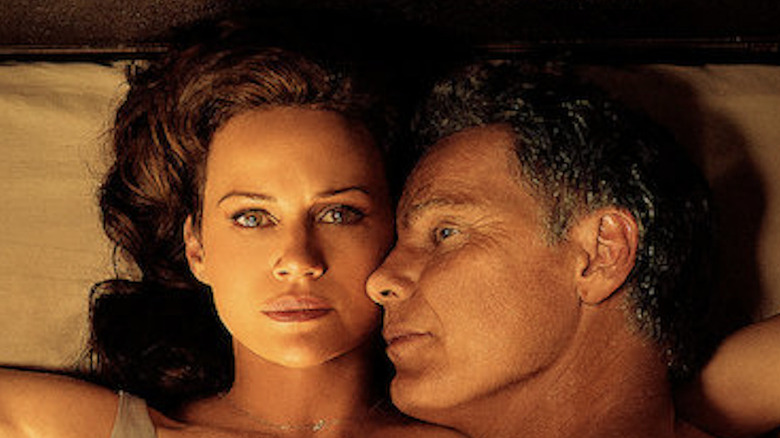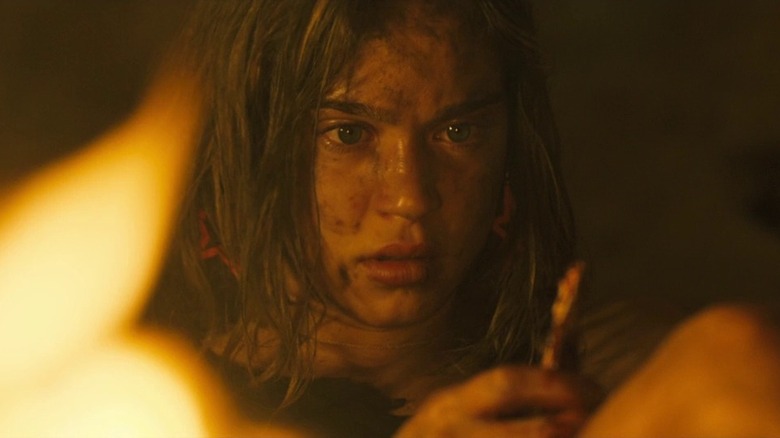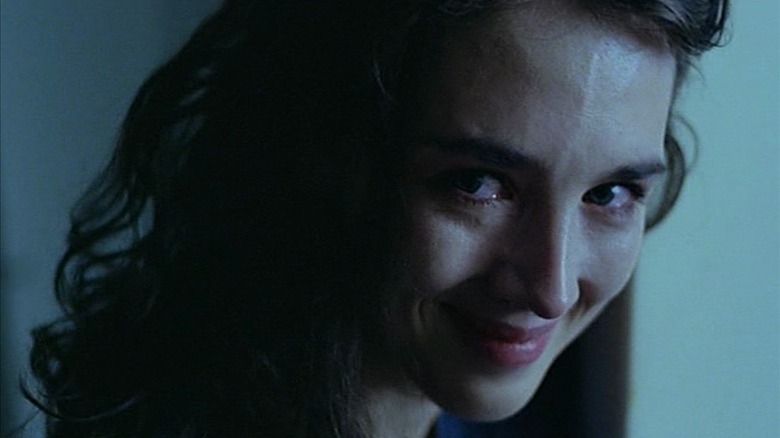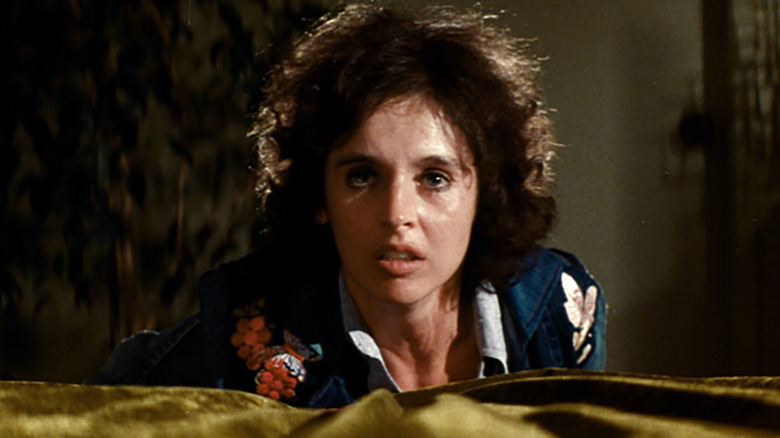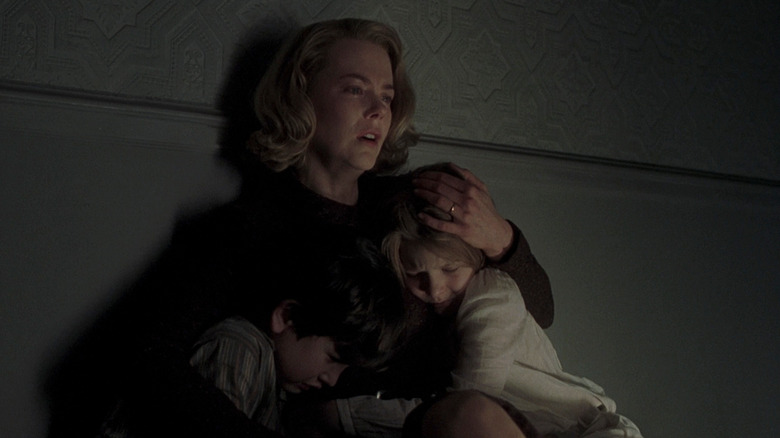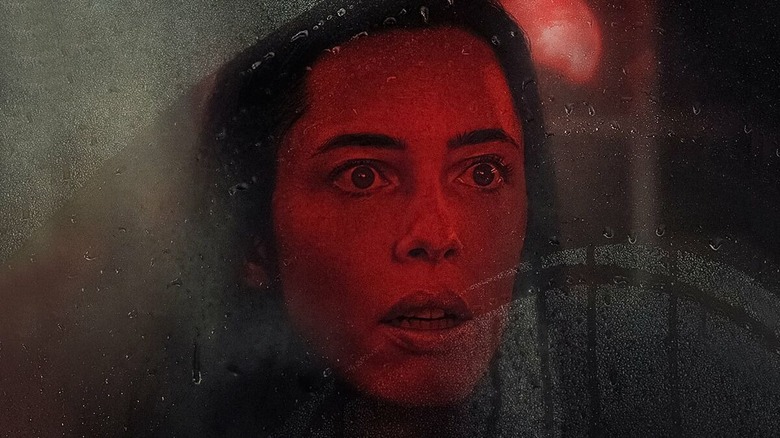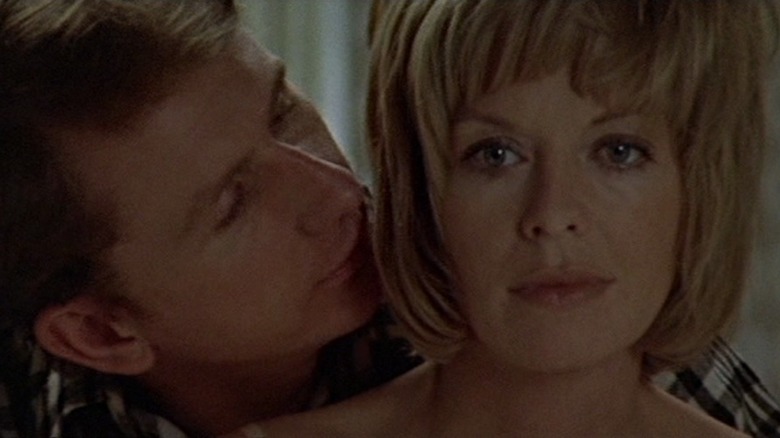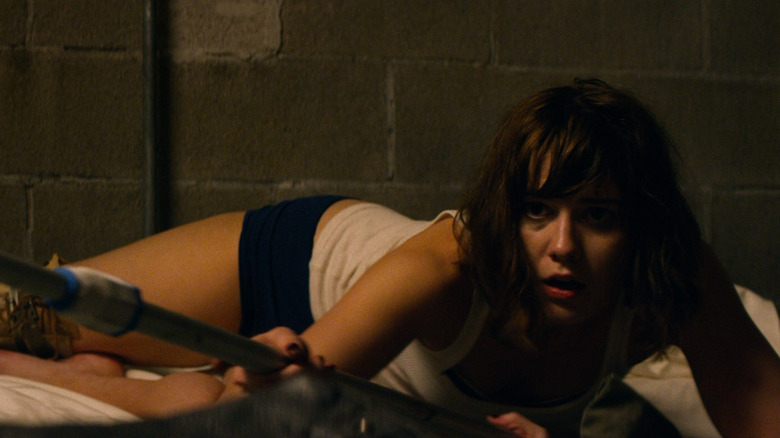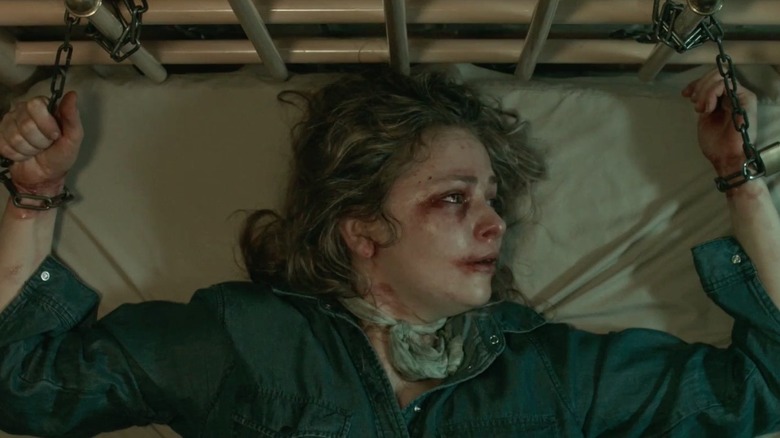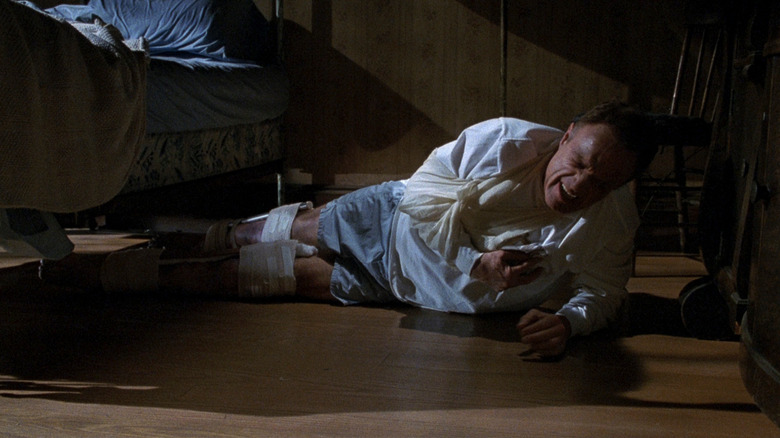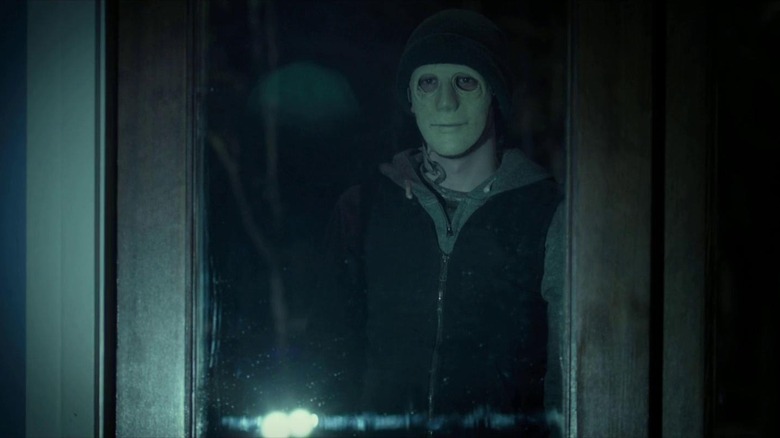Movies Like Gerald's Game That Will Thrill Any Horror Fan
There have been a boatload of Stephen King adaptations, and while some have risen to the heights of cinema royalty (like Stanley Kubrick's "The Shining," Rob Reiner's "Stand by Me" or Frank Darabont's "The Shawshank Redemption"), many others have left something to be desired (1995's "The Langoliers," 1990's "Graveyard Shift," 2004's "Riding the Bullet").
So, you'd be forgiven for raising your eyebrows if someone told you one of the best Stephen King adaptations is a direct-to-Netflix film. Luckily for King fans with access to the streaming service, "Gerald's Game" is indeed an intelligent, engaging adaptation, and proof that it pays to pair King's prose with filmmakers like writer/director Mike Flanagan.
Adapting a King premise long considered unfilmable, "Gerald's Game" is focused on a wife and a husband (Carla Gugino and Bruce Greenwood) who have planned a romantic weekend getaway to breathe new life into their failing marriage. He's brought along handcuffs, she doesn't know about it — and the kinky surprise soon turns into a nightmare. Limited in character and locations yet somehow never claustrophobic, "Gerald's Game" defies its limitations to deliver an engaging, terrifying, emotional viewing experience.
If you enjoyed "Gerald's Game" and are looking for similar films that scratch the suspense itch, we've got you covered. From movies that echo the claustrophobia and survivalism themes of "Gerald's Game" to other excellent King adaptations and gems from Flanagan, here are ten film fans of "Gerald's Game" should check out.
Revenge (2017)
Strictly speaking, "Gerald's Game" isn't really a member of the "rape-revenge" genre; neither is this under-seen feature film that marked an impressive debut from writer/director Coralie Fargeat. Both films take themes from the genre, however, and defiantly twist them into empowering, unexpected tales.
"Revenge" follows Jen (Matilda Anna Ingrid Lutz), an aspiring actress who tags along with her wealthy, married boyfriend (Kevin Jassens) for a romantic weekend in the desert. But when her boyfriend's pals show up early, tensions begin to rise and one of the men sexually assaults Jen. When her boyfriend attempts to buy her silence, Jen takes off, only to be chased off a cliff and left for dead. Spoiler alert: she's not dead.
This twisty thriller will keep you guessing, and on the edge of your seat. As "Revenge" and "Gerald's Game" see it, tenacious survivors come in all shapes and sizes.
If you or anyone you know has been a victim of sexual assault, help is available. Visit the Rape, Abuse & Incest National Network website or contact RAINN's National Helpline at 1-800-656-HOPE (4673).
Possession (1981)
While "Gerald's Game" is about a woman's inner strength and survival instincts, its impetus is a marriage on the rocks.
Such themes lend themselves to what just might be the definitive film about divorce. Andrzej Żuławski's 1981 masterpiece is many things: a national allegory, a treatise on grief, and most obviously, a nightmarish study of fragmented relationships. "Possession" follows a young woman, Anna (Isabelle Adjani), who suddenly abandons her husband Mark (Sam Neill) and young son without any apparent reason. Devastated at the prospect of infidelity, Mark digs deeper.
What he finds is much slimier, alien, and bizarre than any tryst he may have imagined in his head. Featuring not one, but two incredible performances by Adjani (to make matters worse for Mark, doppelgängers abound), "Possession" also features swirling, disorienting cinematography courtesy of French DP Bruno Nuytten. Cinematic insanity that must be seen to be believed, the less you know about "Possession" the better (not that piecemeal plot details can prepare you for the atmospheric totality Żuławski has in store).
The Witch Who Came From the Sea (1976)
A derelict seaside town rots away on an unspecified coast; soft wooden boardwalks coated in salt-stained paint sink steadily into the surf. We follow Molly (Millie Perkins), a local single woman who reveres the hazy memory of her father, a captain who died at sea. Only, Molly's older sister Cathy (Vanessa Brown) remembers things differently. As far as Cathy's concerned, their father was a sexually abusive, violent drunk. Molly rejects her sister's recollection, preferring to drift away on an imaginative riptide that has more ... uh, direct means of dealing with repressed memories of her dark past. Surely it is a coincidence, then, when a shocking double murder carries eerie, blood-soaked echoes of Molly's sadomasochistic daydreams.
A unique oddity in the career of Blaxploitation director Matt Cimber, "The Witch Who Came From The Sea" is a psychedelic psycho-sexual terror trip that must be seen to be believed. Blending aspects of the revenge genre with an experimental flair, the 1976 film also offers an early glimpse into the talents of prolific cinematographer Dean Cundy, who would go on to shoot the likes of "Jurassic Park" and "Who Framed Roger Rabbit."
In terms of explicit linkages, "Gerald's Game" and "Witch" are both interested in women psychologically shackled by their abusive fathers. An exploitation gem that found its way onto the UK's infamous "video nasties" list, "The Witch Who Came From the Sea" is a transfixing, depraved watch that will captivate anyone with an adventurous cinematic appetite.
The Others (2001)
If you came to "Gerald's Game" without reading Stephen King's novel, you may have had questions about ghosts, visions, memories and the blurred lines between them. The ambiguities are terrifying and intriguing, two emotions key to the appeal of the gothic genre.
Enter: "The Others," a 2001 English-language film directed by Chilean director Alejandro Amenábar. The film follows Grace (Nicole Kidman), a buttoned up mother who diligently looks after her two young children, both of whom suffer from light sensitivity. When bizarre events lead Grace to suspect her dark-shrouded house is haunted, her first concern is her kids, who seem especially disturbed by the ghostly presence. If you like that chilly feeling of not knowing exactly what's real and what isn't, "The Others" is a veritable nesting doll of gaslighting, changing circumstances, and rug pulls. It would make a terrific double feature with "Gerald's Game," although you might not want to plan on going to sleep soon after your viewing party.
The Night House (2020)
Combining lakefront properties, blood red skies, and nefarious husbands, 2020's "The Night House" is an inventive modern chiller from "The Ritual" director David Bruckner. The film stars Rebecca Hall as Beth, a widow processing the suicide of her beloved husband. When she starts to suspect that she's being haunted, Beth feels compelled to dig deeper into her husband's past. To say much more would be to give up the ghost, as it were.
While keeping things vague, there are a number of key resonances between "The Night House" and "Gerald's Game." For one, both films are carried by incredibly commanding (and demanding) performances from their lead actresses. Without Hall and Carla Gugino, neither film works. To boot, both films focus on serene lake house properties that steadily reveal themselves to be nightmarish prisons. So if you enjoy heady, script-forward horror films grounded by female leads, you should definitely check out "The Night House."
Images (1972)
As "Gerald's Game" progresses, the mind of its main character begins to conjure up memories from her past to help her survive, both mentally and physically. These helpful (if sometimes mocking and mean-spirited) aspects of her psyche take the form of herself, her husband Gerald, and later, herself as a child. While the apparitions manifest in response to her acute trauma, she relies on both their company and advice to survive.
In "Images," the 1972 psychological horror film directed by New Hollywood superstar Robert Altman, Cathryn (Susannah York) is contending with a similar mental breakdown, albeit with far more tragic results. Cathryn has a hard time teasing out reality from her hallucinations, as her schizophrenia is getting the better of her. And as her mental state comes apart like a rotten rope, she has a harder and harder time determining if the people who come in and out of her life are flesh and blood or figments of her imagination. Hallucinogenic, trippy, and uncanny in its representation of a fracturing mind, "Images" boasts a quiet terror that is hard to shake even after the credits roll.
10 Cloverfield Lane (2016)
Maybe you walked away from "Gerald's Game" in awe of Carla Gugino and Bruce Greenwood's lead performances. Maybe the creativity of the film's small scope really did it for you. But if Jessie's resourcefulness was what set "Gerald's Game" into the stratosphere for you, then you've got to check out "10 Cloverfield Lane."
This JJ Abrams-produced sci-fi survival horror film follows Michelle (Mary Elizabeth Winstead), a young woman who comes to after a roadside accident, finding herself in a stark underground bunker. With her leg out of commission, Michelle must balance her gut instinct to escape with the passionate warnings of her domineering savior, Howard Stambler (John Goodman), who insists she cannot leave under any circumstances because the air outside is toxic.
All told, it's a tall order: wriggle her way out from under her rescuer's thumb while accounting for the possibility that he may or may not be lying about the outside world being dangerous. This is a covert "Cloverfield" sequel after all. From finding a way out of the underground fortress to building a hazmat suit on the fly, Michelle's quick wit and perseverance make for a nerve-wrecking, enthralling watch.
The feature film debut of director Dan Trachtenberg, "10 Cloverfield Lane" is a smart, well-crafted, economically told tale of an overpowered woman overcoming the odds. Come for the suspense, stay for Mary Elizabeth WInstead's character using her skills as a fashion designer to build a gas mask.
Hounds of Love (2016)
Ben Young's thriller might not have broken any box-office records, but it's the kind of movie that you need to see once — and then will never, ever want to watch again. In a good way.
Bluntly put: the film is an unflinching look at a young Australian girl (Ashleigh Cummings) abducted by a predatory couple (Emma Booth and Stephen Curry) who proceed to torture her in their suburban home. To say it's hard to watch is putting things delicately. But if you are going to tell a story like this, refusing to sugar coat things is the fairest way of treating the subject matter with due severity. Without ever feeling exploitative, "Hounds of Love" loosely charts a pathology of the captors, without going so far as to unnecessarily humanize them. Instead, the flick lets us in on this horrific nightmare to show that bogeymen are often just people; hurt and damaged yes, but banal in a terrifying way.
This is, ultimately, one of the theses of "Gerald's Game": that what goes bump in the night is no monster, but a neighbor, a partner, a family member; that under the cheap rubber mask there's always some hurt, angry individual looking for a way to regain a sense of control and power.
Misery (1990)
Another Stephen King adaptation done well, this film had the sense to align itself with Reiner (of "Stand by Me") and "The Princess Bride" screenwriter William Goldman. The result is a classic.
Like "Gerald's Game," this is a King adaptation where the main character is confined to a bed for the vast majority of its runtime. "Misery" follows Paul Sheldon (James Caan), an author who becomes a prisoner thanks to an especially crazed fan. Rescued by Annie Wilkes (Kathy Bates), Paul is initially grateful for Annie's hospitality as she nurses him back to health, but he soon learns she is even more dangerous and unhinged than she looks.
Both "Misery" and "Gerald's Game" tease tension out of the helplessness of their protagonists. Such scenes will make you squirm, but they'll also make you question any bad decisions you may have made in the past that could have potentially found you trapped, alone, and at the mercy of someone else. There are certain themes King has loved returning to time and again during his career, and there are strong parallels to be made between "Misery" and "Gerald."
Hush (2016)
"Gerald's Game" helmer Mike Flanagan has overseen a number of cinematic adaptations of Stephen King's work, carving out a space for himself as one of the preeminent page-to-screen directors of King's novels. But "Gerald's Game" has a great deal in common with one of Flanagan's non-Stephen King projects: 2016's "Hush."
Released on Netflix after its premiere at South by Southwest, "Hush" presents an enticing (and spine-tingling) spin on the home invasion genre. The film follows Maddie Young (played by Flanagan's co-writer Kate Siegel), an author rendered deaf and mute after a bacterial infection at a young age. Living in a cabin in the woods may be no problem for Maddie, but her disability, and her isolated home, prove particularly challenging when a masked man (John Gallagher Jr.) arrives wielding a crossbow. Unable to hear and unable to call for help, Maddie seems to be the perfect victim. Luckily, much like Jessie of "Gerald's Game," Maddie is grossly underestimated, both by the audience and the masked man prowling outside.
One thing "Gerald's Game" pulls off exceedingly well is teasing drama, suspense, and satisfaction out of the resourcefulness of its lead, who faces incredible odds. Drawing from its tension-filled predecessors (including, but not limited to, Terence Young's anxiety riddled "Wait Until Dark"), "Hush" also features one of the greatest on-screen cats of the 21st Century. So if you watched "Gerald's Game" and couldn't help but enjoy the heck out of that German shepherd, good news: Mike Flanagan is a genius when it comes to drawing killer performances out of animals.
